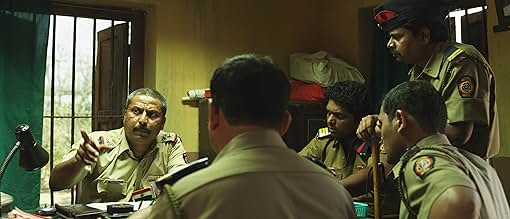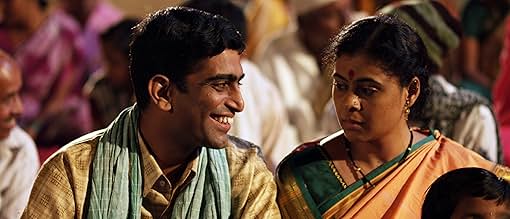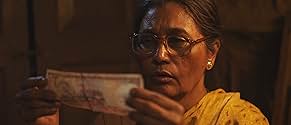IMDb-BEWERTUNG
7,3/10
516
IHRE BEWERTUNG
Füge eine Handlung in deiner Sprache hinzuIn this exploration of money and conscience, a poor woman receives a thousand-rupee note from a politician at election time, but the note proves to be a mixed blessing.In this exploration of money and conscience, a poor woman receives a thousand-rupee note from a politician at election time, but the note proves to be a mixed blessing.In this exploration of money and conscience, a poor woman receives a thousand-rupee note from a politician at election time, but the note proves to be a mixed blessing.
- Auszeichnungen
- 6 wins total
Empfohlene Bewertungen
It would've been better for the masses had 'Ek Hazarachi Note' released prior to elections; director Srihari Sathe's message would've enlightened thousands of illiterate voters. It's a story that tells you about poverty, illiteracy, farmer suicides and corrupt administration.
Budhi (Usha Naik) is an aged mother who has lost her farmer son due to indebtedness. A local leader (Ganesh Yadav) seeking re-election compensates her, giving her a few currency notes of 1000. However, this incident changes her life forever.
The film wins your hearts due to its simplicity. Traditional 'Khandeshi' language creates its own impact. The message is clear – money brings its own set of problems, townsmen will continue to degrade the countrymen and poverty is our biggest enemy. Similarly, authorities can never be honest and impartial. Shrikant Bojewar puts these facts perfectly onto paper.
Usha Naik steals the show as Budhi. But my choice is Sandeep Pathak for his supporting role of Sudama. He has matured after 'Varhad Nighalay Londonla'. Shailendra Barve's music carries a melancholy, suited for the film's theme. It is painful, yet wonderful.
I am going with four out of five stars for 'Ek Hazarachi Note'. The film is a tribute to the director's grandparents. And we must pay our respects as well!!
Budhi (Usha Naik) is an aged mother who has lost her farmer son due to indebtedness. A local leader (Ganesh Yadav) seeking re-election compensates her, giving her a few currency notes of 1000. However, this incident changes her life forever.
The film wins your hearts due to its simplicity. Traditional 'Khandeshi' language creates its own impact. The message is clear – money brings its own set of problems, townsmen will continue to degrade the countrymen and poverty is our biggest enemy. Similarly, authorities can never be honest and impartial. Shrikant Bojewar puts these facts perfectly onto paper.
Usha Naik steals the show as Budhi. But my choice is Sandeep Pathak for his supporting role of Sudama. He has matured after 'Varhad Nighalay Londonla'. Shailendra Barve's music carries a melancholy, suited for the film's theme. It is painful, yet wonderful.
I am going with four out of five stars for 'Ek Hazarachi Note'. The film is a tribute to the director's grandparents. And we must pay our respects as well!!
The movie to me feels like a satirical comedy. The story is beautifully executed, well acted and directed. Somewhere down the line, you live the life of those lead actors, and empathize with them. It's sad, hard hitting raw movie, which is true to its story and maybe real in rural India. It's a recommended movie for its powerful story and great performances.
This film depicts the helplessness and tragedy of the poor in context of a corrupt, unfeeling system through a well enacted, crisply directed and edited movie. In the midst of this, there is an amazing humanity and fellow feeling to make the characters real.. and possible to relate to, even if you have never been in these situations.
The protagonist has excelled in depicting this absolutely heart warming person who seems to have taken life on the chin, and is surviving in extreme poverty with dignity and self - respect - in many ways, this is all she has. Her friend is a young man with whom she shares affection and care - again, a tip of my hat to the writer in creating such engaging characters. Scenes of making tea in a field or in a hovel have a warm intimacy due to the friendship these two characters share.
The direction and editing is really well done - there are hardly any superfluous moments and you never feel like any scene is dragged unnecessarily.
Worth a watch but the covert torture (I cannot think of any other suitable word) of the poor is hard to stomach.
The protagonist has excelled in depicting this absolutely heart warming person who seems to have taken life on the chin, and is surviving in extreme poverty with dignity and self - respect - in many ways, this is all she has. Her friend is a young man with whom she shares affection and care - again, a tip of my hat to the writer in creating such engaging characters. Scenes of making tea in a field or in a hovel have a warm intimacy due to the friendship these two characters share.
The direction and editing is really well done - there are hardly any superfluous moments and you never feel like any scene is dragged unnecessarily.
Worth a watch but the covert torture (I cannot think of any other suitable word) of the poor is hard to stomach.
This movie was magic from beginning to end. The story is relevant to what goes on between the rich and the poor, all over the world and especially here in the USA with the tense political climate here now, Usha Naik is amazing and totally believable. I highly recommend this film,
The movie opens in the village and happy surroundings but ends at a very interesting point. The concept was nice but the only problem with the movie was it was poorly edited. Before climax, one might feel what's happening and feel that some characters are overreacting, but soon you will realize injustice and a tragic story is a theme of the movie. Movies first half consists of only showing the characters' daily routine. There are only two three characters and taking 30 minutes to show their daily routine is a bit too long. They could have easily reduced movie-length by at least 15 minutes. But I think the makers of this film wanted to make a full-length movie and realized there is a very short concept so they just extended the first half. As the movie's first half is poorly edited, it feels a little boring as no one can see only the characters' daily routine for so long in a movie. They could have made a short film on it which definitely would have been wonderful, but they just deviated from the main concept a lot to make it a full-length movie. Some dialogues are unnecessary and some are poorly written. To be honest there were many flaws script. They tried to show the sad reality of society with some incorrectly placed dialogues. Indeed it is the reality of society, but you cant show it in any movie at any place because it didn't go with the mood of the scene. For example, in the middle, one dialogue related to Gandhiji is there. It feels completely unnecessary therein that scene, but at the end of the movie, you will realize it did go with the theme of the movie. So one big mistake of the writers was he took a very long time to start the main concept, which confused the viewer or me and I just started to think that what this movie is exactly all about. Giving viewers time to think about what will happen ruins the movie climax. Indeed I didn't guess at all that this will happen in the climax because before the climax movie was filled with many unnecessary elements but it doesn't mean the movie is unpredictable as the climax felt like it was a completely new plot point introduced in the movie at the end. The whole concept takes place after the interval only so they should have made the first half building block for the second half.
But my respect for the movie jumped extremely high when the last scene came. It was very beautiful, very touching, and very thoughtful. The note flies and carries all the anger of the buddhi with it. It gives a good message to kick out the good-looking & pleasurable things which creates problems for you. The note was an analogy for a friend who is influencing you in a bad way or your bad habits which you think is cool.
So "once you realize it is not meant for you, just throw it away, even if means a lot to you" was the film's message. So overall, I will say it is a one-time watch movie. Hoping to see more work from writers and director but properly edited.
But my respect for the movie jumped extremely high when the last scene came. It was very beautiful, very touching, and very thoughtful. The note flies and carries all the anger of the buddhi with it. It gives a good message to kick out the good-looking & pleasurable things which creates problems for you. The note was an analogy for a friend who is influencing you in a bad way or your bad habits which you think is cool.
So "once you realize it is not meant for you, just throw it away, even if means a lot to you" was the film's message. So overall, I will say it is a one-time watch movie. Hoping to see more work from writers and director but properly edited.
Wusstest du schon
- WissenswertesUsha Naik didn't want to do the film because of auditions.But her son convinced her to do the film as younger generation should know her acting skills.
Top-Auswahl
Melde dich zum Bewerten an und greife auf die Watchlist für personalisierte Empfehlungen zu.
Details
- Erscheinungsdatum
- Herkunftsland
- Offizielle Standorte
- Sprache
- Auch bekannt als
- Nota de Mil Rúpias
- Drehorte
- Produktionsfirma
- Weitere beteiligte Unternehmen bei IMDbPro anzeigen
Box Office
- Bruttoertrag in den USA und Kanada
- 2.404 $
- Eröffnungswochenende in den USA und in Kanada
- 1.697 $
- 25. Sept. 2016
- Weltweiter Bruttoertrag
- 2.404 $
- Laufzeit1 Stunde 29 Minuten
- Farbe
- Seitenverhältnis
- 2.35 : 1
Zu dieser Seite beitragen
Bearbeitung vorschlagen oder fehlenden Inhalt hinzufügen

Oberste Lücke
By what name was 1000 Rupee Note (2014) officially released in India in English?
Antwort











